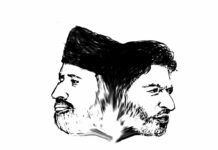SHEIKH QAYOOM
The union home minister, Sushil Kumar Shinde’s statement that he would try and understand the real problem of Kashmir before inviting the separatist leaders to know what they actually want has not surprised many. On the face of it, the statement conveys an impression that the union home minister would really now make an effort to personally understand the problem before discussing it with those who demand its solution.
Sushil Kumar Shinde is the new home minister of the country, but the office of the home minister is a continuum. There are no full stops in offices and no matter who takes over the assignment, the approach and understanding of problems is always handed down from the predecessor to the successor. Does Mr. Shinde intend also to understand the problem of the Naxals before he addresses it? Does he intend to understand the problem of the Indian farmers before he addresses the burning issue of increasing farmer suicides in the country?
The governments in a democratic setup are essentially different from dictatorships because the understandings and obligations in them are legitimately handed down from one to the other. It is, therefore, in line with this very spirit of collective responsibility in the democratically elected governments that countries with such systems own and respect national and international obligations. In a democratic country, no government that comes to power through the process of vote can disown an IMF loan taken by its predecessor. In a dictatorship, the successors always disown the obligations of the predecessors.
How can Mr. Shinde claim a lack of understanding of a highly sensitive issue like the Kashmir problem when his predecessor, Mr. Chidambaram, not only setup a group of interlocutors on Kashmir, but also engaged himself with the working of the interlocutors? Tomorrow, if there is another reshuffle in the union council of ministers, would the new incumbent have to learn his lessons from zero as Mr. Shinde claims to be doing now? Kashmir has been the Waterloo of many a political reputation and it would only be unfortunate if that of Mr. Shinde were to be become its latest victim.
Shinde is a senior Congress leader and a statement like the one he made recently does not go down well with his reputation. Nobody, at least in Jammu and Kashmir, would be na?ve enough to believe that the statement contains an element of sincerity. It is what has always been the standard approach to the over 60-year-old problem. The approach of delaying reflects that the state is living in a state of self-denial. The reaction to Mr. Shinde’s statement by senior separatist leader, Syed Ali Shah Geelani led Hurriyat Conference has been on the expected lines. How can the separatists engage in a dialogue process with somebody who admits a complete lack of knowledge about the very problem he intends to discuss with them?
Peace is on everybody’s agenda and it is called for most strongly by none other the people of Kashmir who have been stewing in their own soup for such a long time. Every dimension of local life is not only directly linked with the prospect of peace in Kashmir, but more essentially, the existence of every Kashmiri depends on the permanence of peace. But, peace will have to be negotiated so that it becomes permanent. It cannot be enforced permanently.















